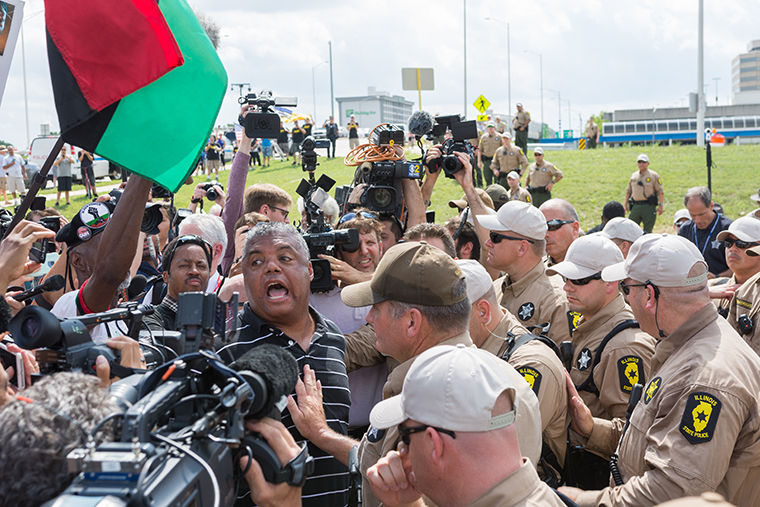Twelve arrested as protesters attempt to shut down Kennedy Expressway
September 6, 2018
Police arrested 12 people during a Labor Day protest where activists demanded change for the South and West sides and the resignation of Mayor Rahm Emanuel, who announced Tuesday that he would not seek re-election.
The Rev. Gregory Livingston attempted to lead protesters onto the Kennedy Expressway and was among those arrested. The CPD estimated 40-50 people marched to the top of the Cumberland Avenue ramp, where they were met by Illinois State Police officers. Arrests were made around 12:30 p.m., after officers told the protesters to move off the highway.
“We’re going to continue to protect the First Amendment rights of those people who want to protest,” said Anthony Riccio, first deputy superintendent of the CPD in a press conference after the march. “When people want to start obstructing roads, start blocking traffic and the public as a whole, that’s when we run into situations like this.”
Protesters remained respectful during arrests and Livingston did not resist, said Major David Byrd, the regional commander for Illinois State Police.
“I’m amazed at how professional everybody was in making sure we protected everybody’s right to have freedom of speech,” said Frank Kaminski, chief police officer in Park Ridge. “It was an event that we can all be very proud of.”
Unlike protests over the summer that caused the shutdown of the Dan Ryan Expressway and Lake Shore Drive, police officers were unwilling to shut down the Kennedy Expressway. Riccio said police needed to balance the rights between the protesters’ First Amendment rights and people’s right to get to the airport and use the expressway.
Arvel Wynne, a protester at the event from the South Side, said a goal of the protest location was to make the Northwest Side of Chicago feel uncomfortable by shutting down O’Hare National Airport.
“People make changes when they’re financially affected, so if we have to come out here and affect Chicago financially to get attention, then that’s what we have to do,” Wynne said.
Members of the Northwest Side Coalition Against Racism and Hate joined Livingston. After arrests were made, police followed the coalition onto the grass and sidewalk as they continued to protest.
“We have not accomplished anything, we’ve just showed our presence,” said Carolyn Ruff, a member of the coalition.“We have people in the line fighting against us, and that’s not positive—that’s not peaceful. If you’re going to fight with us, you stand with us.”
Protester’s called attention to the lack of education and economic opportunities on the South and West sides. The demands from the group include resources for anti-violence initiatives and re-investments of the Chicago Public Schools closed by Emanuel.
“[There is a] destruction of jobs all over the country, but especially in parts of the country like the South and West sides of Chicago,” said Michael Sprinker, a protestor at the event from Mayfair.
“It’s obvious that a lot of companies, and Chicago government alike, have taken the opportunity to get rid of work, then they’re shocked when people aren’t working.”
Thomas Cook, a protester from Edgewater, said he thinks protests will continue throughout the city.
“Shutting down the expressway is a very small issue compared to the number of people getting shot every weekend on the South and West sides and the lack of resources there,” Cook said. “This is a small inconvenience compared to the huge inconvenience most people on the South and West sides face on a daily basis.”








